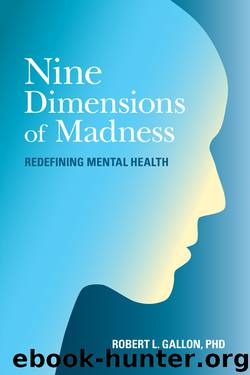Nine Dimensions of Madness by Robert L. Gallon

Author:Robert L. Gallon [Gallon, Robert L.]
Language: eng
Format: epub
Tags: PSY036000 Psychology / Mental Health
ISBN: 9781583949276
Publisher: North Atlantic Books
Published: 2015-09-07T16:00:00+00:00
Psychological and Social Context
Is autism a disability visited on us by faulty genes, a paucity of mirror neurons, or some other brain abnormality? Or does it describe one variation in the way people perceive and feel—a “different mind” as Penny Spikins calls autism. Is it possible that the traits of autism have existed in society for many millennia and continue to exist today because they bring important assets to our species? Despite any social disadvantages autism may create, individuals with these traits can and do make significant contributions to society.
Spikins, an archaeologist from Cambridge University, has theorized that autistic traits have been part of the human genome for as long as 160,000 years.315 The emergence of modern human behavior brought with it the human trait of compassion for others, which allowed the acceptance of these different minds. She believes that it is precisely these autistic minds that made many of the technical and cultural advances that mark our species and gave us an evolutionary advantage over other hominids.
She has written, “Individuals with autism may have brought into our societies extraordinary focus, talents in analytical thought and skills in innovation.”316 It may have been what DSM-5 calls autism’s “restricted repetitive patterns of behavior, interests or activities” that led to innovations from making tiny stone tools to recording and understanding astronomical systems. Spikins writes, “part of the reasons Homo sapiens were so successful is because they were willing to include people with different minds in their society.”
Even in our modern world, there is a good deal of evidence that people with autistic traits can have unique capabilities. If the social circumstances are right, such people can be highly successful because of—not despite—their autism. This is not to say that there aren’t autistic children who are very impaired and extremely difficult to rear. But even some of these children can learn to overcome their serious social limitations and allow their extraordinary talents to shine through. The real challenge for our society is creating a tolerant and effective environment that allows such people to thrive. As professor of psychiatry and autism researcher Laurent Mottron states, “most (autistics) face the harsh consequences of living in a world that has not been constructed around their priorities and interests.”317
Mottron has offered a very different environment for autistic people. He has welcomed eight of them into his research group and has seen them do extremely well. He knows that they can contribute a great deal in settings such as scientific research. His long-time collaborator is an autistic woman named Michelle Dawson. He met her while filming a television documentary on autism and hired her as a research assistant. He writes, “when she edited some of my papers, she gave exceptional feedback and it was clear that she had read the entire bibliography.”
Dawson helped Mottron challenge the assumptions and negative bias that even people studying autism tended to have. He has pointed out that the diagnostic criteria for autism omit any positives. Even when autistic people outperform others on tasks, it is usually considered compensatory for deficits.
Download
This site does not store any files on its server. We only index and link to content provided by other sites. Please contact the content providers to delete copyright contents if any and email us, we'll remove relevant links or contents immediately.
The Art of Thinking Clearly by Rolf Dobelli(8840)
The 5 Love Languages: The Secret to Love That Lasts by Gary Chapman(8492)
Mindhunter: Inside the FBI's Elite Serial Crime Unit by John E. Douglas & Mark Olshaker(7833)
Becoming Supernatural by Dr. Joe Dispenza(7103)
Nudge - Improving Decisions about Health, Wealth, and Happiness by Thaler Sunstein(6633)
The Road Less Traveled by M. Scott Peck(6633)
Enlightenment Now: The Case for Reason, Science, Humanism, and Progress by Steven Pinker(6405)
Win Bigly by Scott Adams(6310)
Mastermind: How to Think Like Sherlock Holmes by Maria Konnikova(6233)
The Way of Zen by Alan W. Watts(5797)
Factfulness: Ten Reasons We're Wrong About the World – and Why Things Are Better Than You Think by Hans Rosling(4020)
The State of Affairs by Esther Perel(3926)
Gerald's Game by Stephen King(3917)
Man's Search for Meaning by Viktor Frankl(3630)
The Confidence Code by Katty Kay(3566)
Thinking in Bets by Annie Duke(3530)
The Worm at the Core by Sheldon Solomon(2917)
Enlightenment Now by Steven Pinker(2913)
Liar's Poker by Michael Lewis(2810)
